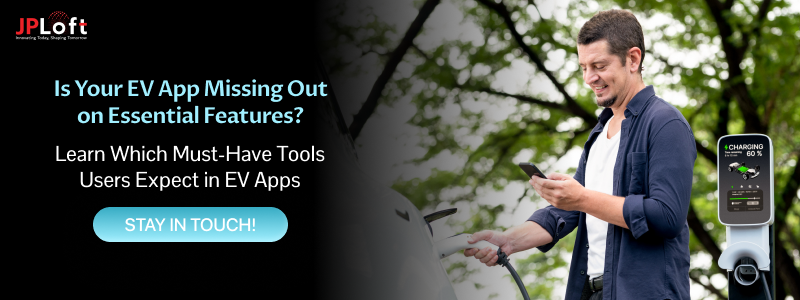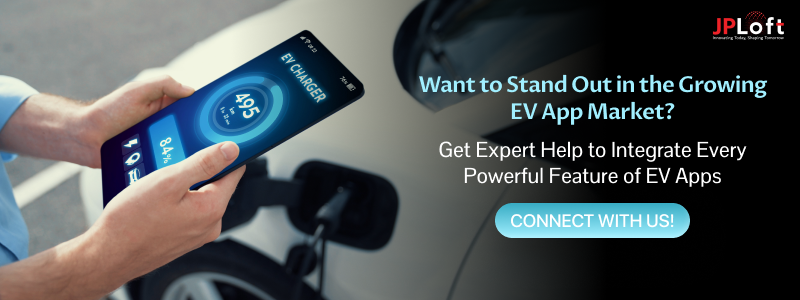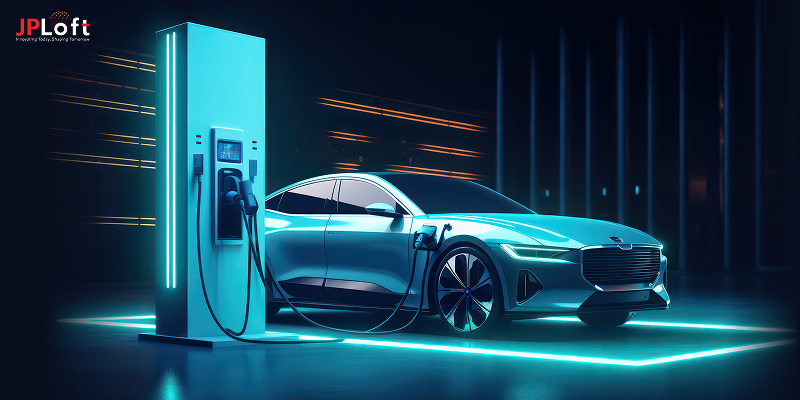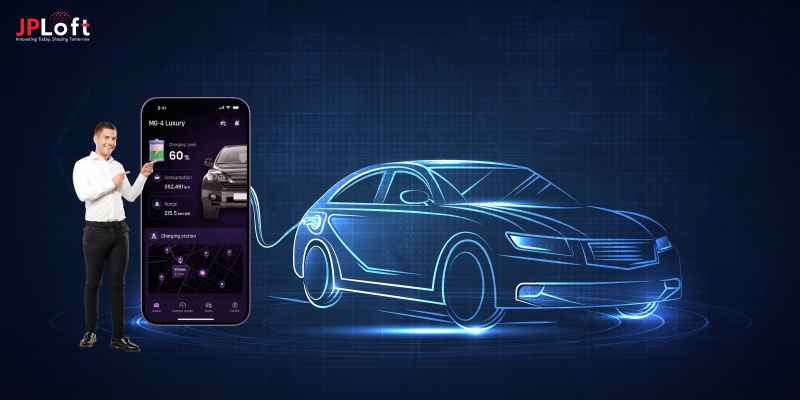As electric vehicles (EVs) take the front seat in the global push towards sustainable transportation, mobile apps have become the digital backbone of the EV ecosystem.
From real-time charging information to remote diagnostics, the features of EV apps are revolutionizing how users, manufacturers, and admins interact with electric vehicles. This blog explores the top functionalities that define a robust EV app, ensuring smooth performance, smart navigation, and optimized user experience.
Whether you're developing a new EV platform or refining an existing one, these insights are your roadmap to innovation.
What is an EV App?
An EV app is designed to deliver a seamless digital experience by offering a variety of integrated services within a single platform. Users can locate nearby charging stations, monitor battery levels, access vehicle diagnostics, and even book charging slots through the app.
Additionally, EV apps enable smart navigation by guiding users through the most energy-efficient routes, helping to maximize battery life and reduce travel time. They also allow real-time tracking of EV performance, giving users detailed insights into their vehicle's behavior and efficiency.
With advancements in AI and IoT, the EV app features of 2025 are becoming increasingly intelligent, personalized, and predictive, making electric vehicle ownership more efficient, convenient, and tech-driven than ever before.
Essential Features of EV Apps
While an electric vehicle software development, a clean and feature-based mobile interface plays a vital role in providing an efficient, smooth, seamless, and compelling experience to diverse types of users.
As electric vehicle ecosystems are backed by various stakeholders such as customers, administrators, and manufacturers, there is a need to take the modular approach into consideration while designing the mobile app.
Let's go in-depth into features of EV apps, discovering what every panel must have and how these functions collaborate to create a powerful digital partner for both EV managers and users.
► Customer Panel Features
The customer panel is the core of any EV app. It is created to give users real-time control, convenience, and intelligent assistance so that they get the best EV driving experience. All these are the basic features of EV app design and should be considered the topmost priority while designing an EV app.
1. Real-Time Charging Station Locator
One of the must-have features of the best EV charging apps is a real-time charging station locator which cannot be done without. This electric vehicle app feature employs GPS integration to assist users in discovering compatible EV charging stations in the vicinity of their present location.
The locator is more than a map function, as it permits filters by charger type (AC, DC), status of availability, distance, and even cost. This is especially helpful in metropolitan areas where various public or private charging facilities are available.
For on-demand users, this is an important on-demand EV app feature that enhances convenience and decision-making.
2. Battery Monitoring & Management
Another essential tool in the list of features in EV apps is real-time battery monitoring. It enables users to monitor their battery levels, estimated range, and charging cycle condition.
Push notifications are made when the battery level is low or when charging is complete. It protects against range anxiety and facilitates energy-efficient driving. This is one of the best EV app features for daily commuters and long-distance EV drivers.
3. Intelligent Route Planning
Intelligent route planning is one of the electric vehicle features of 2025 that relies on AI algorithms to recommend the most efficient routes. It takes into account battery power, terrain, traffic conditions, and charging stations along the way.
This feature for EV app not only provides increased driving comfort but also assists users in extending the range of the car by reducing non-essential energy use. It works hand-in-hand with map services to provide turn-by-turn directions and smart suggestions.
4. Remote Vehicle Control
Envision your EV controlled from your phone. This futuristic and advanced feature of EV app lets users remote-start or shut-off charging, lock or unlock their car, and even set the in-car climate before entering the vehicle.
It supports smart home integrations as well as increases user convenience, particularly in harsh weather conditions. It's surely one of the top features of EV app experiences for tech-enthusiasts.
5. In-App Digital Payments
EV users require an easy payment process to pay for charging, maintenance booking, or subscription plans. Secure gateway integration allows users to make payments directly from within the app through UPI, credit/debit cards, or digital wallets.
This EV app feature eliminates friction in charging and incentivizes premium services provided through the app.
6. Personalized User Profiles
A welcome feature in EV apps is user personalization. By remembering user preferences like navigation style, performance mode, language, and notification settings, the app can provide a personalized experience for each user.
It enhances satisfaction and increases retention by providing a customized interface.Partnering with the best mobile app development company ensures that such personalization features are implemented seamlessly, enhancing both usability and retention.
7. Trip History & Usage Reports
This is a capability where users can see precise summaries of their previous journeys, distance covered, power consumed, and money saved as against fuel automobiles.
With time, these reports enable users to keep track of their efficiency and learn about their driving habits. It also serves as a good guide to EV maintenance.
8. Push Notifications and Alerts
These notifications keep the user apprised of such important events as charging completion, software updates, maintenance schedules, and even local charging bargains. These live updates are must-have features EV app systems for keeping the user actively engaged and informed.
From a development of mobile apps viewpoint, these are the fundamental and essential features of EV apps that must be supported by each customer-side interface. They constitute the digital control layer that unites the driver with their vehicle in real-time.
► Admin Panel Features
The admin panel takes care of the backend functions and offers management of users, services, and business processes. These admin features for EV apps provide an effortless and effective experience of management.
1. User Management Dashboard
Admins should have access to a safe dashboard where they can handle all users, create, edit, suspend, or delete accounts. Admins can also track user activity and preferences to see behavioral patterns or anomalies.
2. Charging Station Management
This EV app feature enables admins to add, modify, or delete charging stations in the app. It offers performance information for each station, tracks downtime, and maintains real-time updates of availability.
This comes in handy when dealing with a huge charging infrastructure across various regions.
3. Billing and Transaction Control
One of the most critical items on the list of features in EV apps is control over transactions. Admins can monitor payment histories, revenue reports, and refund requests. Automated invoicing and safe record-keeping guarantee users have a seamless financial experience.
4. Feedback and Support Ticketing
This on-demand electric vehicle app feature allows users to raise support tickets or feedback directly from the app. Admins can see, assign, and close issues efficiently, increasing customer satisfaction and response time.
5. Analytics and Insights Dashboard
Regarded as among the best in EV app management, this dashboard provides data visualizations of usage trends, energy usage, peak hours of activity, and customer habits. These are used to aid strategic business decisions and enhance app performance in the future.
6. Geo-Fencing & Location Control
Admins utilize geo-fencing to limit vehicle operations or features by geographical regions. For example, restricting high-speed charging to authorized zones or shutting off vehicle access within forbidden areas provides an additional layer of safety and compliance.
To build and manage these features effectively, many businesses choose to hire dedicated developers who specialize in admin dashboard architecture and backend logic. This ensures your EV app remains robust, secure, and performance-driven at scale.
These features of on-demand EV apps support a stable, secure, and user-friendly EV network. From app management to real-time control, the admin panel plays a central role in providing consistent performance.
► Manufacturer Panel Features
The manufacturer panel facilitates the backend operations for OEMs and vehicle builders. These functionalities make the vehicles current, reliable, and upgrade-ready for the future.
1. Vehicle Health Monitoring
Advanced telemetry enables manufacturers to remotely track the health of different EV components. This advanced feature of EV app identifies early warnings of failure, provides real-time notifications, and allows the scheduling of predictive maintenance.
It allows the manufacturer to build confidence and lower warranty claims.
2. Firmware Over-the-Air (FOTA) Updates
FOTA is perhaps the most sophisticated and best EV app feature for contemporary mobility. FOTA enables manufacturers to push vital software updates to customers' vehicles directly without the need for a physical trip to a service center.
This guarantees every vehicle remains current with the current security standards and performance boosts.
3. Performance Analytics
This capability gives manufacturers information about the usage of vehicles, how well they are working under various conditions, and how their parts age with time. This facilitates ongoing improvement in design and manufacturing.
4. Inventory & Supply Chain Monitoring
The application allows manufacturers to track their supply chain in real-time, right from vehicle component inventory through delivery schedules. This is an important feature for EV app systems targeting logistics optimization.
5. Warranty & Compliance Management
With this feature, manufacturers are able to monitor vehicle warranties, automate compliance reports, and confirm their products comply with the requirements of various markets and geographies.
It simplifies regulatory demands and minimizes paperwork.
Each of these modules, customer, admin, and manufacturer panels, together includes all the essential features required in EV app systems to provide an excellent experience. If you want to create an app, ensure to include these essential and innovative features to remain relevant in the rapidly changing EV marketplace today.
Tips to Choose the Right EV App Features
Choosing the right features is the cornerstone of building a powerful, user-focused EV application. Since electric vehicles cater to a range of users, from daily commuters to fleet operators and OEMs, it’s important to prioritize functionalities that align with your business goals, EV app development trends, customer expectations, and future scalability.
Here are some smart tips to help you select the right features of EV apps for your project:
-
Understand Your Target Users: Before listing out features, define who will use your app. Is it for private EV owners, charging station operators, fleet managers, or EV manufacturers? Each audience has unique needs.
-
Prioritize Must-Have Over Nice-to-Have: Start with the must-have features of EV apps like charging station locators, battery monitoring, in-app payments, and route optimization. These essential tools form the base experience for all users.
-
Balance Basic and Advanced Features: There needs to be a balance between basic features of EV app (e.g., trip history, user profiles, real-time alerts) and advanced features of EV app (e.g., smart diagnostics, FOTA updates, geo-fencing). A feature-rich app improves retention but too many at once may overwhelm new users.
-
Think Mobile-First: Always analyze the user journey from a mobile app perspective. Features should be optimized for mobile usability, speed, and responsiveness. Easy navigation, real-time syncing, and instant push notifications are vital for enhancing user engagement.
-
Future-Proof with AI and IoT: If you’re developing an EV app, consider integrating AI in the electric vehicle for smart suggestions and IoT for real-time vehicle monitoring. These technologies are no longer optional, they’re becoming a standard in electric vehicle app features of 2025 and beyond.
Along with all, it is recommended to hire mobile app developers, who are well-aware of these tips and tricks and can help you scalable, high-performing app packed with the right features for EV app users.
Powering EV Apps with AI, ML, and NLP
As the EV industry continues to evolve, technologies like Artificial Intelligence (AI), Machine Learning (ML), and Natural Language Processing (NLP) are playing a pivotal role in shaping next-generation mobile experiences.
These innovations are not just optional enhancements, they're becoming essential for delivering intuitive, personalized, and intelligent EV applications. Also, these tech is solving the EV adoption challenges, and offering the expected convenience to the users.
With AI development services, EV apps can analyze user behavior, recommend optimized charging schedules, and enable predictive vehicle maintenance. Meanwhile, ML development services allow the app to continuously learn from usage data, improving route suggestions, battery performance analytics, and real-time decision-making.
Incorporating NLP development services further elevates the user experience by enabling natural, voice-based interactions. Users can ask the app to locate charging stations, schedule servicing, or get vehicle health updates using conversational commands, hands-free and hassle-free.
Together, these smart technologies not only enhance the overall usability but also future-proof your app in the competitive EV market. If you're building an EV platform for 2025 and beyond, AI, ML, and NLP should be at the core of your development strategy.
Build Future-Ready EV Apps with JPLoft
Whether you're a growing startup or a large-scale enterprise entering the electric mobility space, JPLoft is your go-to electric vehicle app development company for building scalable, intuitive, and feature-rich mobile solutions.
With extensive experience in on-demand mobility, connected vehicle platforms, and IoT-driven systems, we specialize in crafting EV apps that meet the evolving needs of modern users. From real-time charging station locators to battery monitoring and remote vehicle control, our solutions are designed to offer convenience, intelligence, and seamless performance across Android and iOS platforms.
What sets us apart is our focus on innovation, usability, and long-term scalability. Our team of skilled developers understands the complexities of electric vehicle ecosystems and brings deep technical expertise to every project.
Whether you’re building a consumer-focused app or a full-scale EV fleet management solution, we can turn your vision into a high-impact digital product fast, secure, and future-ready.
Final Wrap-Up
In the rapidly evolving world of electric mobility, features of EV apps are becoming the key differentiators in user satisfaction and brand loyalty. Whether it’s about helping users find charging stations, monitoring battery health, or allowing manufacturers to send remote updates, every feature must serve a clear purpose.
As we move towards a smarter, more connected future, EV apps need to evolve beyond the basics. Including AI-driven insights, predictive maintenance, and real-time user feedback systems is no longer a luxury, it's a necessity.
If you're planning to enter this space or upgrade your existing platform, make sure your EV app includes the right mix of basic, advanced, and on-demand EV app features.
FAQs
The must-have features include real-time charging station locators, battery monitoring, smart route planning, remote controls, in-app payments, and push alerts.
Basic features offer core functionality like navigation and battery tracking. Advanced features include AI recommendations, FOTA updates, predictive diagnostics, and geo-fencing.
Focus on your target audience’s needs, prioritize essential features first, and look at competitor apps. Balance usability with scalability for future growth.
Yes, AI can predict optimal charging times, suggest efficient routes, analyze driving behavior, and improve energy use, making your app smarter and more useful.
They enable smart predictions, personalized features, and voice-based controls, making EV apps faster, easier, and more user-friendly.













Share this blog